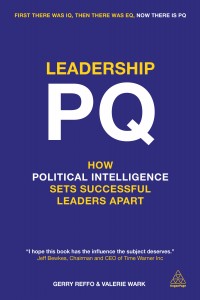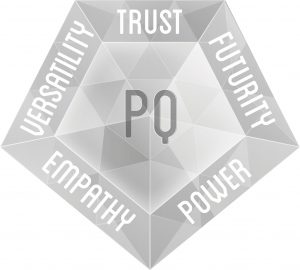By Gerry Reffo and Valerie Wark
Leadership Alert! There are times when the classic development of leaders no longer fully equips them or their organisations for success. This is one of those times. Below Gerry Reffo and Valerie Wark explain why leaders need Political Intelligence.
Globalisation, complex societal challenges, changes in the environment, population, wealth and technology mean that the world is becoming more interdependent. Technology is connecting citizens across the world. Information that was once only known to a few is becoming visible to almost all. Business, government and society are drawn closer together by the reality of shared power. No one organisation is in single control of its destiny.
Muhtar Kent, Chair and CEO of The Coca-Cola Company comments that “government can’t do it alone. For capitalism to thrive it has to connect all stakeholders, not just shareholders.” He describes it as a “golden triangle” that connects government, business and civil society. All three sectors must find new and better ways to work together to create a better future
for society.
Critical to success is the understanding that businesses are part of a wider societal system and that society expects them to step up to the mark. Forward-thinking leaders take opportunities to do business in a way that positively impacts society because they’re part of society and it makes good business sense. Examples of this include Coca-Cola, Unilever, PUMA, EDF, Facebook and many more. In these cross-sector partnerships power is shared.
So What Do Leaders Need To Do?
Leading these partnerships is not easy. Operational decision-making is messier when power is shared. Control is reduced. Complexity increases. Competing interests emerge. Information must be shared – including all the things that make people look bad. Activities must be more transparent and different views need to be respected. All of which means that finding solutions takes longer.
Leaders need to build into their organisation’s DNA an understanding of shared power and the perspective of being part of a wider societal system.
We consulted senior leaders who worked in business and government leading multi stakeholder partnerships. What we found may surprise you. The skills and behaviours that drive success in all sectors are remarkably similar. We call it Political Intelligence (PQ) and it is the leadership capacity to interact strategically in a world where government, business and wider society share power to shape the future in a global economy.
We’ve identified five facets of PQ in which leaders have to be skilled in order to work in a sustainable way with multiple stakeholders: Futurity, Power, Empathy with Purpose, Trust and Versatility. (See Figure 1)
Most leaders are good in one or two of these facets. The key is that leaders need mastery of all five in harmony in the complex world of multiple stakeholder relationships, so that they use the right behaviour at the right moment.
How Do Leaders Develop PQ in their Organisations?
Companies should train their emerging leaders to work with the new political reality and give them the experience and expertise to make their dealings with politicians an integral part of their approach to business. Sir John Grant observes “the next generation of business leaders will have to think like businessmen as well as put themselves into the shoes of politicians.”
The challenge facing leaders in government is how to get over initial mistrust of business motives and deliver long-term innovative outcomes to benefit society. So if the argument holds that the next generation of business leaders will need to put themselves into the shoes of politicians. The next generation of public policy leaders must acquire some of the skills of business.
 In our book, Leadership PQ (Kogan Page, 2014), we define each facet and share stories from respected international leaders that bring the skills and behaviours to life. We also provide suggestions and top tips based on our experience as leaders, coaches and tutors about how to develop your individual PQ capability.
In our book, Leadership PQ (Kogan Page, 2014), we define each facet and share stories from respected international leaders that bring the skills and behaviours to life. We also provide suggestions and top tips based on our experience as leaders, coaches and tutors about how to develop your individual PQ capability.
For leaders who want to develop PQ capability within their organisations we provide suggestions on how to integrate PQ development with existing HR systems. Leadership PQ is shortlisted by the Chartered Institute of Management for best book 2014 in the Management Futures category.
About the Authors
 Gerry Reffo, CMG, was Head of Learning and Development in the UK Foreign and Common-wealth Office and is now a senior independent HR consultant and Ashridge Business School accredited executive coach. She develops leaders and helps organisations improve what they do and how they do it.
Gerry Reffo, CMG, was Head of Learning and Development in the UK Foreign and Common-wealth Office and is now a senior independent HR consultant and Ashridge Business School accredited executive coach. She develops leaders and helps organisations improve what they do and how they do it.
 Valerie Wark is an independent executive coach and leadership tutor and an Associate of Ashridge Business School. She is widely known for innovative programme design and executive coaching that delivers results.
Valerie Wark is an independent executive coach and leadership tutor and an Associate of Ashridge Business School. She is widely known for innovative programme design and executive coaching that delivers results.




























![“Does Everyone Hear Me OK?”: How to Lead Virtual Teams Effectively iStock-1438575049 (1) [Converted]](https://www.europeanbusinessreview.com/wp-content/uploads/2024/11/iStock-1438575049-1-Converted-100x70.jpg)




